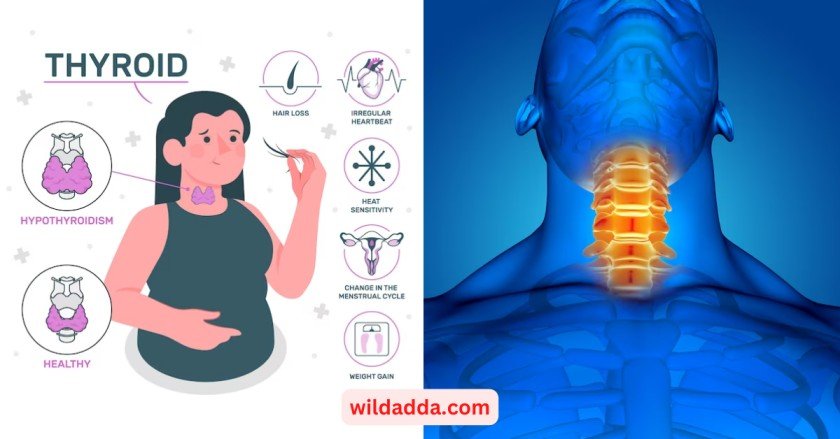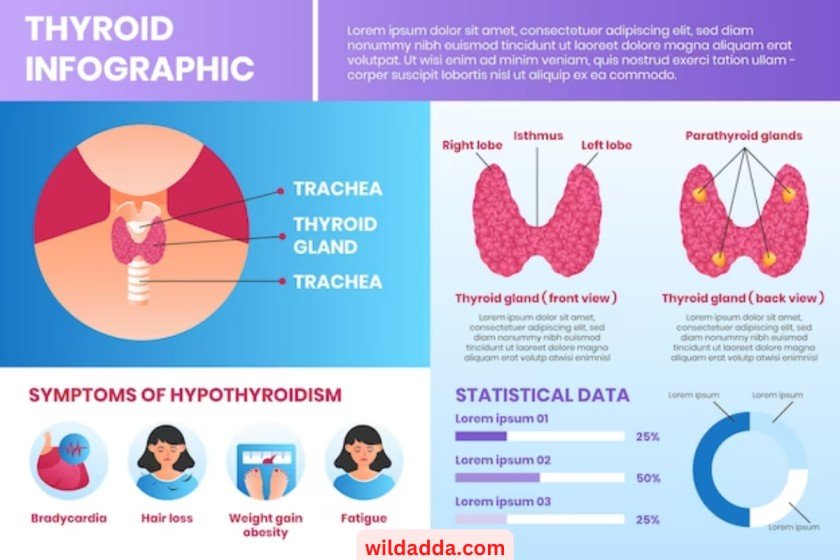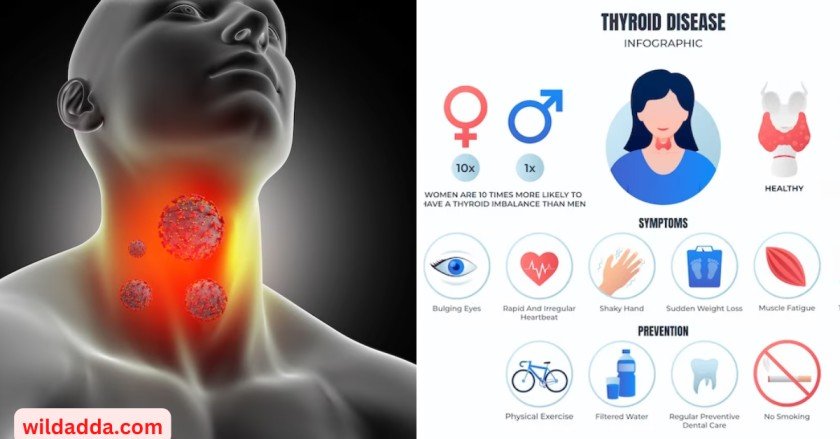Table of Contents
Introduction of Thyroid Health
Monitoring and managing thyroid health from the comfort of home grows increasingly viable in 2024 through various medical advancements empowering patient self-testing. Combining connected diagnostic gadgets, telehealth access to doctors online, and easy-to-use health tracking apps – those exhibiting common thyroid disorder symptoms can take greater control over disease identification and subsequent lifestyle adjustments for improving wellbeing.
This guide covers smart home strategies for detecting potential thyroid issues:
Basal Body Temperature Tracking
At-Home Blood Tests for Hormone Levels
Neck Checks for Physical Changes
Digital Symptom Logging Apps
Implementing one or more of these thyroid testing tactics under medical consultation aids early intervention against developing hypo/hyperthyroidism – helping halt progression to chronic lifelong conditions needing sustained treatment. Let’s examine how home thyroid health tracking works.

| Foods/Diet | Benefits/Impact | Exercise | Benefits |
|---|---|---|---|
| High Fiber Foods – Whole grains, legumes, vegetables, fruits | Improves gut health and nutrient absorption which supports thyroid functioning | Light Cardio – Brisk walking, swimming, stationary biking | Boosts metabolism and circulation reducing fatigue |
| Probiotic Foods – Yogurt, kefir, fermented items | Restores healthy gut flora balancing immune responses to prevent autoimmune thyroiditis | Yoga Poses – Shoulder stand, Fish pose, Plow pose | Helps stimulate and strengthen the thyroid; calms mind |
| Antioxidants – Berries, tea, selenium/zinc foods | Removes free radicals exacerbating inflammation damaging thyroid | Light Resistance Training | Builds muscle mass increasing basal metabolic rate aiding weight loss |
| Omega-3s – Fish, nuts, seeds | Reduces inflammation and risk of nodules impairing thyroid status | Rhythmic Breathing Exercises | Relieves stress; oxygenates body optimizing thyroid hormone circulation |
| Vitamin D Rich Food – Salmon, egg yolks, mushrooms | Essential for balanced mood, metabolism and neurological health | Outdoor Early Morning Walks | Sunlight exposure boosts vitamin D improving thyroid functioning |
| What To Do | What Not To Do |
|---|---|
| Check for family history of thyroid disorders | Ignore vague symptoms like fatigue or sudden weight changes |
| Get TSH blood tests done annually | Self-medicate with thyroid hormones without medical guidance |
| Examine neck visually and with hands for changes | Take symptom logging apps data as conclusive diagnoses without doctor consultation |
| Learn optimal iodine and selenium dietary intake | Overeat soy, vegetables disrupting hormone balance |
| Discuss abnormal at home thyroid test results with doctors | Neglect regular full body health checkups |
Basal Body Temperature Tracking
Fluctuations in basal body temperature (BBT) upon awakening correlates strongly with over/underactive thyroid disorder symptoms in females. Logging BBT data over menstrual cycles highlights patterns connected to low metabolism.
Smart thermometers like iProvèn or Tempdrop sync insightful charts via app visualizing cycle trends, flagging outcomes deviating above 36.8°C (body temperature if thyroid working properly). Sustained low BBT below 36.4°C indicates hypothyroidism. High variability points to hyperthyroidism.
Integrations with period trackers like Flo Health cross-analyze pituitary-ovary-thyroid axis interplay through the menstrual cycle. Expert commentary explains significance of findings for needing clinical tests or supplemental thyroid hormone boosters like levothyroxine tablet regimens keeping metabolism balanced.
Easy self-testing tapping biometrics combats dismissal of nonspecific complaints like fatigue and weight gain in women. Data-drivem insights assist telehealth consults with endocrinologists to evaluate next steps managing low thyroid problems spotted early.

At-Home Blood Tests for Hormone Levels
Directly tracking thyroid stimulating hormone (TSH) and thyroid antibody levels from home blood testing kits accurately diagnoses likelihood of Hashimoto’s and Graves’ disease onset. Handheld gadgets like Everlywell’s Thyroid Test provide painless at-home phlebotomy analyzing TSH, T3, T4 counts.
Anti-TPO, Anti-TG antibody tests further check autoimmune responses. Connected mobile apps generate lab report PDFs within days detailing exact concentrations of each thyroid biomarker against reference ranges. Abnormal results prove crucial tangible proof justifying clinical scrutiny.
Seeking telehealth consultations through platforms like PlushCare allows discussing diagnostics for appropriate prescription specifics like synthroid doses restoring optimal hormonal balance mitigating debilitating hypo/hyperthyroid symptoms plaguing lifestyle absent checks.
Easy affidavits also facilitate insurance claim reimbursements for approved cases. DIY blood investigations offer affordability and convenience determining hormonal medication needs.
Neck Checks for Physical Changes
Visual neck examinations and tactile palpations checking for signs of thyroid enlargement facilitate early discovery of inflammatory responses or nodules requiring ultrasound imaging.
Handheld smartphone attachment tools like Shine examine thyroid biometrics handsfree. The unique wand beams medical grade transducer pulses analyzing tissue stiffness, composition, vascularity – powered by AI to classify malignancy risks for each scanned nodule reporting within minutes.

The intuitive Shine Health companion app interprets results suggesting next steps like repeating diagnostic scans after 3-6 months to gauge growth rates warranting fine needle biopsies. 80% classification accuracy ensures optimal intervention well before complications emerge.
For physically feeling thyroid shape irregularities, simple self-checks done routinely aiding early detection involves:
- Sitting upright while positioning fingers across one’s neck area around Adam’s apple location.
- Swallowing water to feel thyroid gland lift up under skin. Compare left vs right sides for size/texture variances.
- Gently pressing fingers sideways around neck to sense stiffness and tenderness, noting any protruding nodules.
Logging abnormalities aids discussions with doctors, qualifying ultrasound or surgical needs before permanency of found abnormalities.
Digital Symptom Logging Apps
Logging everyday observations of numerous thyroid disorder symptoms through apps like Ada Health facilitates analyzing temporal connections with potential triggers that worsen or alleviate issues.
Key markers include tracking fatigue, weight changes, mood variability, menstrual cycle irregularities, hair fallout rates, appetite, digestion – rated periodically for severity levels. Food/medicine intake, sleep durations are also logged establishing correlation.
Ada app’s proprietary AI sifts data determining related health issues with high precision. For example, recurring fatigue and insomnia incidents traced temporally with iron supplements intake might indicate underlying thyroid problems worsening through oxidative stress. Findings get discussed privately with remote physicians.

Conclusion
In summary, DIY home strategies for monitoring thyroid health in 2024 offer greater patient empowerment and independence in early disease identification – paving pathways for timely treatment interventions long before advanced complications manifest. Leverage connected diagnostic gadgets and health apps conveniently from home for taking charge of fitness.
FAQS
- What are the most common symptoms of a thyroid disorder?
The most common symptoms indicating possible thyroid dysfunction include unexplained weight changes, abnormal body temperature sensitivities, constant fatigue, changes in heart rate, mood swings, muscle weakness, hair loss, sleep disturbances, and irregular menstrual cycles. - What blood tests help diagnose thyroid issues at home?
At-home thyroid test kits that analyze important biomarkers like TSH, T3, T4, thyroid antibodies can accurately reveal hormone imbalances pointing to hypo/hyperthyroidism before complications emerge. Seek doctor guidance interpreting results. - Can you check for thyroid cancer with at-home screening tools?
Yes, the innovative Shine wand – a smartphone-based ultrasound device allows self-scanning neck area to visualize thyroid for malignant nodule risks using AI for analysis. It guides next steps like repeat scans after few months or needing clinical biopsies before spreading. - What vitamins and supplements support healthy thyroid function?
Key nutrients that help optimize thyroid hormone balance include iodine, selenium, zinc, omega-3 fatty acids, probiotics, vitamin D, antioxidants from vitamin C foods like citrus fruits and cruciferous vegetables. - What lifestyle habits ruin your thyroid health?
Habits that risk impairing thyroid function involve chronic stress, sedentary routines lacking exercise, nutrient poor high inflammatory diets, gut health imbalance through food sensitivities, and exposure to endocrine disrupting toxins present in some plastics and cosmetics.
Read More……
Science-Based Strategies to Improve Gut Health Naturally in 2024
